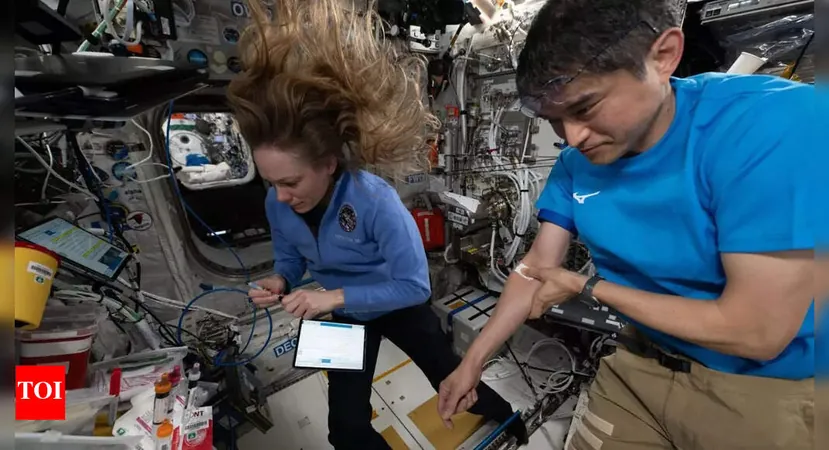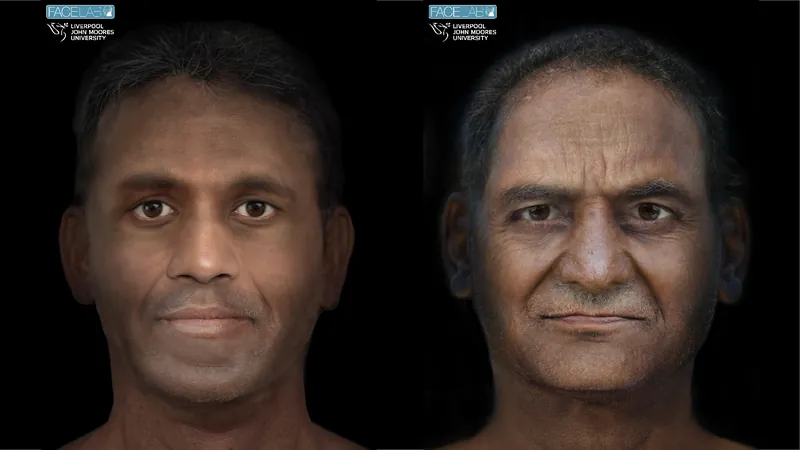
How NASA is Revolutionizing Astronaut Health Monitoring Aboard the ISS
2025-07-18
Author: Wei Ling
NASA's Health Odyssey in Space
As humanity gears up for ambitious missions to the Moon, Mars, and beyond, NASA is leaving no stone unturned in its quest to safeguard astronaut health during spaceflights. Aboard the International Space Station (ISS), a comprehensive suite of medical tests and cutting-edge wearable technology is being utilized to monitor astronauts' well-being in the harsh environment of space.
In-Depth Research: Monitoring Health in Microgravity
Astronauts like Nichole Ayers and Anne McClain are at the forefront of groundbreaking human research studies. Recently, Ayers, alongside JAXA Commander Takuya Onishi, collected crucial blood samples to study how the unique stresses of spaceflight influence cellular immune function. Meanwhile, McClain focused on heart health through ultrasound scans and blood pressure measurements, revealing early indicators of artery stiffness and blood flow changes that may be linked to microgravity conditions.
But that’s not all! Innovative wearable tech from the Canadian Space Agency, including the Bio-Monitor headband and vest, allows for real-time tracking of vital signs during everyday activities such as exercise and sleep, seamlessly sending data back to medical teams on Earth for continuous analysis.
Dual Focus: Crew Health and Space Systems
While prioritizing astronaut health, these space pioneers also ensure that vital systems aboard the ISS are functional. Jonny Kim and Takuya Onishi diligently inspected life support systems like catalytic reactors and hatch seals, maintaining a safe environment for all crew members. Concurrently, botanical research taking place in the Kibo module explores how plants adapt and thrive in microgravity, which not only aids in food production but also unlocks biological insights beneficial for Earth.
In collaboration with Roscosmos crew members, astronauts are also undergoing respiratory diagnostics and treadmill fitness evaluations, all of which are integral to a broader NASA strategy aimed at preparing for long-duration missions. These assessments emphasize the importance of crew autonomy and the reliability of onboard systems.
Preparing for the Future of Space Exploration
From heart scans to habitat inspections, NASA's multifaceted approach to astronaut health monitoring is vital for ensuring the success of future deep space missions. With a clearer understanding of the effects of spaceflight on the human body, NASA is not only paving the way for safe crewed explorations but is also gaining insights that could enhance healthcare practices here on Earth. The quest for knowledge continues as NASA strives to secure the future of space exploration!


 Brasil (PT)
Brasil (PT)
 Canada (EN)
Canada (EN)
 Chile (ES)
Chile (ES)
 Česko (CS)
Česko (CS)
 대한민국 (KO)
대한민국 (KO)
 España (ES)
España (ES)
 France (FR)
France (FR)
 Hong Kong (EN)
Hong Kong (EN)
 Italia (IT)
Italia (IT)
 日本 (JA)
日本 (JA)
 Magyarország (HU)
Magyarország (HU)
 Norge (NO)
Norge (NO)
 Polska (PL)
Polska (PL)
 Schweiz (DE)
Schweiz (DE)
 Singapore (EN)
Singapore (EN)
 Sverige (SV)
Sverige (SV)
 Suomi (FI)
Suomi (FI)
 Türkiye (TR)
Türkiye (TR)
 الإمارات العربية المتحدة (AR)
الإمارات العربية المتحدة (AR)